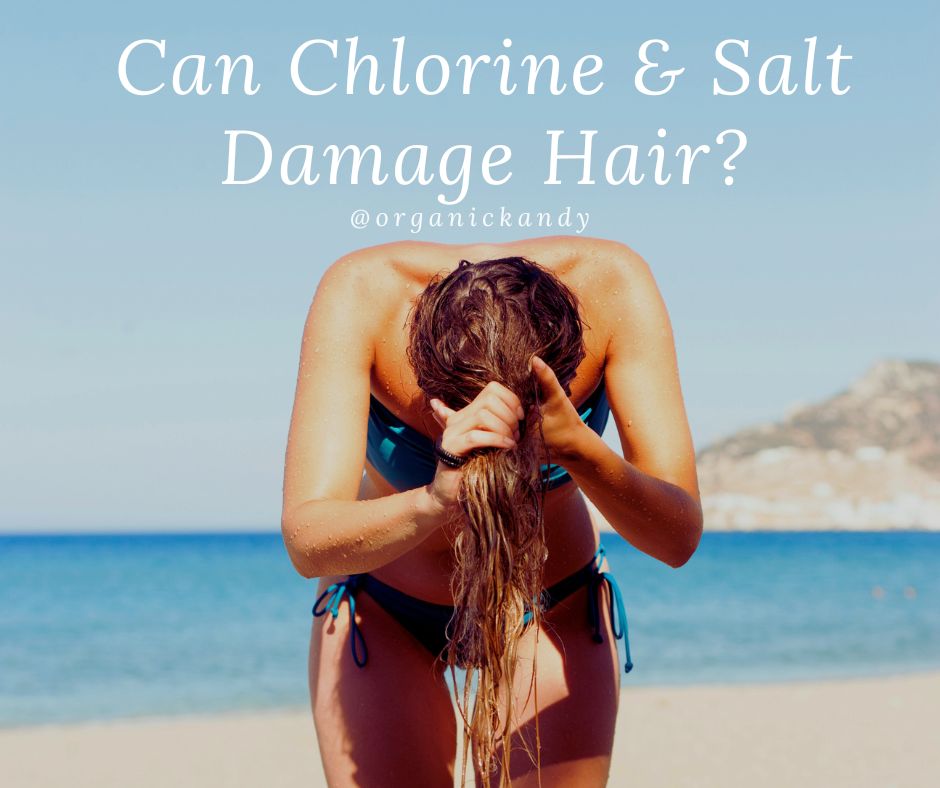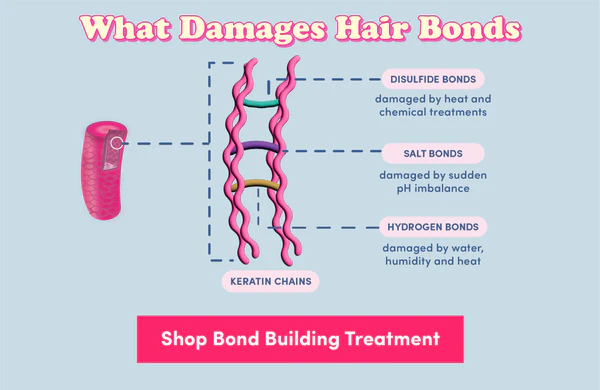
If you’ve clicked on the blog you have already asked yourself this question:
Can salt and chlorine damage hair?
Yes. Yes it can damage your strands beyond repair if you’re not taking the proper care and steps to prevent it in the first place.
I was a lifeguard for 2 years at my local pool back when I was 20 and I had noticed how over the course of 2 years my hair had gone from medium thickness to splitting and thinning out on the bottom and lengths of my hair. It become much lighter due to the fact I was outside working 6-11 hour shifts, but because of the UV + chlorine damage it was receiving, there was no way for it to remain healthy like it had been.
I was causing damage to my hair and I didn’t even know it! It surprised me because it had felt like overnight that my hair didn’t have the fullness it used to, but it was in fact a very gradual process.
You can also tell that your hair is damaged based off of the texture and if its from sunlight, it’ll be “bleach blonde” or a much lighter appearance if you have darker hair.

Damage doesn’t discriminate, regardless of the color, heat damage, salt water, chlorine or even daily habits can cause damage to your hair. The more you color, bleach, or spend time outside will determine the overall state of your hair.
Salt water damage:
Salt water can damage your hair by permanently breaking down the salt bonds that we have in our hair. These salt bonds makeup the structure, texture, as well as appearance of the hair shaft. They make up 1/3 of your hair’s strength and can be damaged by pH imbalances. The other two are disulfide bonds that are damaged by bleach and chemical treatments and hydrogen bonds that are damaged by excessive heat and moisture.

Salt water doesn’t just damage the way your hair looks, by making it dry, brittle, and frizzy it causes damage to the cuticle (the root of your hair) and if this goes untreated the hair can be irreversibly damaged.
How can you prevent salt water damage?
Limit the amount of time you spend in ocean or even putting your hair up/out of the water and wearing a wide brim hat can prevent salt water damage as well as UV damage from the sun!
- Dampening your hair with fresh/purified helps your hair to absorb that water first.
- Some people will coat their hair in coconut oil or (or a lighter carrier oil like olive oil, sweet almond, and or apricot oil) aids in putting a solid moisture barrier to prevent your hair from losing its natural moisture barrier.
- Even putting a hair mask on before going swimming is better than doing nothing at all!
- Washing your hair after going swimming in the ocean is ideal because leaving the salt in your hair causes build up as well as continuously will dry your hair out the longer you leave it in.
- If you have a sensitive scalp, refer to top of this list. A hair mask, hair oil, or some just not letting your hair come in contact with the salt water can go a long way.
Chlorine Water Damage:
Chlorine is what we use in pools as a sanitizer/anti-bacterial solution so we are not swimming in unfiltered microbes, bacteria, and algae. It oxidizes these things and helps keep swimmers from becoming ill from the water they are swimming in.
Chlorine just like salt water damages the salt bonds in your hair. Both have long term and lasting effects if you do not properly treat your hair and take measures to protect it.
Chlorine has been shown to have a chemical reaction similar to salt water in the sense that it is able to strip the lipid barrier that our hair naturally produces aka: our scalps oil that keeps it healthy. You can tell that this chemical reaction has taken place when you touch your scalp and it feels dry. The appearance will look dry, frizzy, as well as cause tangled hair because it completely removes any and all natural oils. Because of this, it can lead to hair damage such as breakage and cause it to become highly poruos.
This effect isn’t just on our hair it also strips the lipid barrier on our skin and can cause dryness there as well.
If you’re having these symptoms: tight, itchy, red, dry, inflamed or flaky scalp/skin then that means that you’ve spent a very long time in the pool and should be on your way to getting out.
Fun fact: chlorine is found in our tap water, but it is not nearly as strong and won’t cause as much damage as swimming in a pool for an hour could cause. (If you don’t have any form of protection for your hair).
How can you prevent chlorine damage?
- Drenching your hair in purified/filtered water can help prevent further absorption of the chlorinated water. Hair naturally expands when wet and can only absorb so much, that’s why people recommend this method before even entering the pool or the ocean.
- A swim cap aides in keeping your hair intact, lose hair is more prone to become tangled and matted once it dries.
- Conditioning your hair before and after you venture into chlorine is a great idea! This be something as simple as putting a hair mask in before going to the pool or as I mentioned prior with salt water, coating your hair with oil can put up a good barrier at locking that moisture in.
- Coating your hair in oil such as coconut oil, sweet almond oil, or apricot oil can aid in your hair from becoming dried out. (Afterwards tying your hair into a braid put it into a protective style and locks that moisture in while you swim)
Hard water is also a contestant in causing damage to our hair. (Click here to learn about hard water and its long term effects on the hair).
